Top E-commerce Web Hosting Providers for 2025
By Alex Carter on October 25, 2024
Selecting the right e-commerce web hosting provider is essential for ensuring an online store operates efficiently. A reliable hosting service ensures website accessibility, security, and smooth transaction processing without interruptions.
Unlike standard web hosting, e-commerce hosting is specifically designed for online businesses, offering features such as secure payment processing, inventory tracking, and robust data protection. Business owners can choose from SaaS-based platforms or self-hosted solutions, making it crucial to evaluate factors like cost, performance speed, website uptime, and customer support to determine the ideal option.
What Is E-commerce Web Hosting?
E-commerce web hosting is a specialized hosting service designed to support online stores by providing the necessary infrastructure, security, and performance optimization. Unlike standard web hosting, e-commerce hosting includes features tailored to managing and scaling an online business.
A web hosting provider allocates server space where all the files, databases, and essential components of an e-commerce site are stored and maintained. Depending on business needs, merchants can either rent shared hosting, opt for dedicated servers, or choose cloud hosting solutions for scalability and flexibility.
Beyond storing website files, e-commerce hosting services are designed to improve website performance, maintain security, and support online transactions. Key features of e-commerce web hosting include:
- Shopping cart software – Enables customers to add products and proceed to checkout smoothly;
- Payment processing – Integrates with secure payment gateways for online transactions;
- Traffic management – Handles high volumes of visitors, especially during peak sales periods;
- Shipping and tracking – Supports order fulfillment with shipping calculators and tracking tools;
- Database management – Manages product listings, customer accounts, and transaction histories efficiently;
- Advanced security – Protects sensitive customer data through SSL certificates, encryption, and fraud prevention tools.
Choosing the right e-commerce web hosting solution is essential for ensuring fast load times, uninterrupted site availability, and a secure shopping experience for customers.
Types of E-commerce Hosting
When selecting an e-commerce hosting solution, there are two main options: SaaS hosting and self-hosting. Each has its own advantages depending on budget, technical expertise, and business requirements.
SaaS Hosting
Software-as-a-service (SaaS) hosting is built into the e-commerce platform you use to create and manage your online store. This option is ideal for business owners who want a simple setup without handling technical configurations. The platform manages hosting, domain connections, security, and updates, eliminating the need for coding or server management.
SaaS hosting is often the most affordable option, particularly for small businesses. It typically includes key e-commerce features such as payment processing, inventory management, and point-of-sale (POS) tools, all bundled into a single monthly subscription.
Self-Hosting
For businesses that require more control and flexibility, self-hosting is an alternative. Hosting providers offer different plans based on storage, bandwidth, and site performance needs.
- Shared Hosting – This is the most budget-friendly option, where multiple websites share the same server. While it keeps costs low, site performance may be affected by traffic spikes from other users on the server. It’s suitable for new or small businesses but may require an upgrade as traffic increases;
- Virtual Private Server (VPS) – A VPS provides a dedicated portion of a server, offering more storage, bandwidth, and control over configurations. This option reduces the risk of slowdowns caused by other sites and is a good starting point for businesses expecting growth;
- Dedicated Server – With a dedicated server, your website is the only one using the infrastructure. This ensures maximum performance, speed, and security. It’s the best choice for businesses handling high traffic volumes, but it comes with higher costs.
While self-hosting provides greater customization and control, it can become expensive. Hosting providers often charge more for additional storage, faster loading speeds, and premium support. These costs should be factored into overall e-commerce expenses.
Top 10 E-commerce Web Hosting Providers
Shopify

Shopify is the most widely used e-commerce platform, hosting over 25% of online stores. It delivers reliable hosting with 99.99% uptime and employs a Content Delivery Network (CDN) to ensure quick access for customers worldwide, regardless of growth.
Shopify’s e-commerce platform comes with a suite of built-in features, including:
- Free SSL certificates;
- Unlimited bandwidth;
- Free domain name;
- Unlimited email forwarding;
- PCI compliance;
- User-friendly shopping cart software.
By automating hosting updates, Shopify minimizes downtime and reduces technical management, allowing you to focus on your business operations.
G2 Rating: 4.4 out of 5 stars
Pricing: Starting at $29/month as part of the e-commerce platform package. A free trial is available.
Hostinger
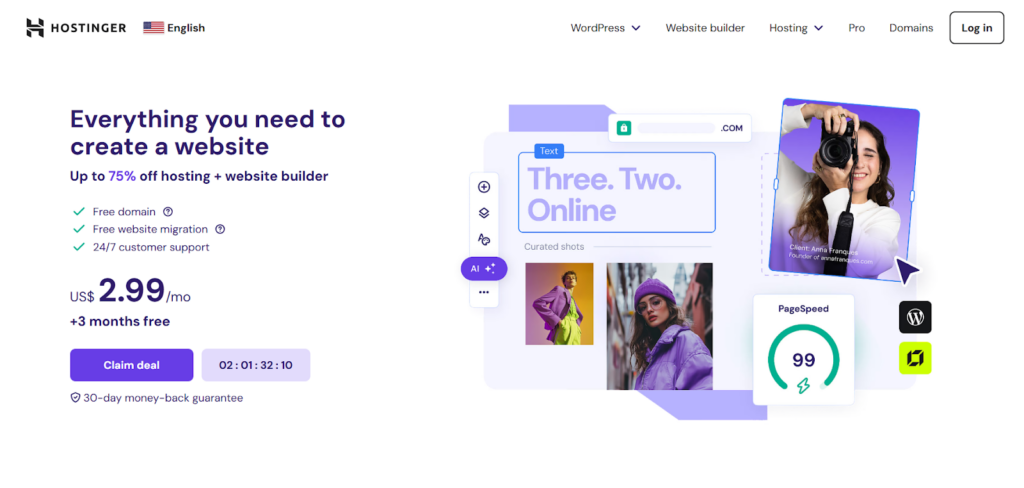
Hostinger provides e-commerce hosting designed to build a reliable online store. Using cloud-based technology, Hostinger ensures fast loading speeds and strong security features that keep your store operational even during high traffic. Its user-friendly control panel (hPanel) and integrated management tools make it a practical option for businesses that need to launch or expand their online operations without requiring advanced technical skills.
Features:
- High performance with NVMe storage, dedicated resources, and global data centers;
- Robust security including free SSL, DDoS protection, backups, and a firewall;
- Scalable plans supporting up to 300 websites with upgrade options;
- User-friendly setup with hPanel, one-click installation, and free migration;
- e-commerce tools with payment integration and shopping cart support.
Pricing: Pricing starts at $7.99/month for the Cloud Startup plan, which includes 200 GB of NVMe storage, 3 GB of RAM, and support for up to 300 websites.
G2 Rating: Hostinger holds a solid reputation among users, with a G2 rating of 4.4 out of 5 stars, reflecting its affordability, performance, and responsive customer support.
GoDaddy
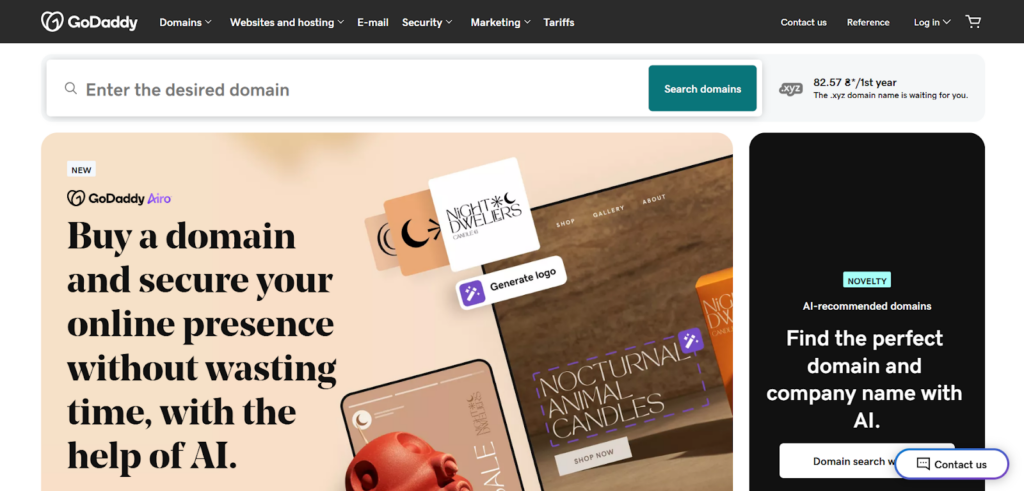
GoDaddy is a leading hosting provider with 8.76% of the market share, primarily serving WordPress-based websites. It offers four different packages tailored to varying requirements in storage, bandwidth, and processing power for e-commerce stores.
Each plan includes:
- 24/7 network security;
- Access to 150 free apps;
- Global data centers for fast loading times;
- Free one-click WordPress installation.
As your e-commerce business grows, you may need to upgrade to a higher-tier plan—such as the Ultimate or Maximum package—to secure faster processing power, additional storage (100 GB), and free SSL certificates.
G2 Rating: 3.9 out of 5 stars
Pricing: Starting at $9.99/month for the economy package.
Bluehost
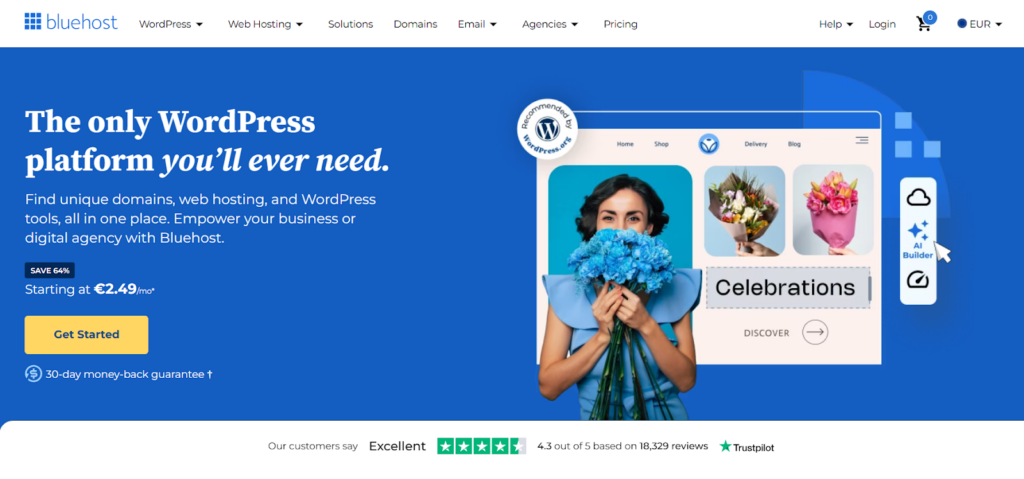
Bluehost is a reliable hosting option for e-commerce sites built on WordPress or WooCommerce, offering plans that cater to various budgets—from shared hosting for beginners to VPS options for growing businesses.
Each hosting package includes features such as:
- Unlimited products;
- Integrated payment processing;
- Free domain registration;
- 30 GB SSD storage.
Keep in mind that some features, like domain privacy and unmetered bandwidth, are only available on premium plans. Prices can also increase once the introductory offers expire.
G2 Rating: 3.5 out of 5 stars
Pricing: Starting at $9.95 per month.
IONOS
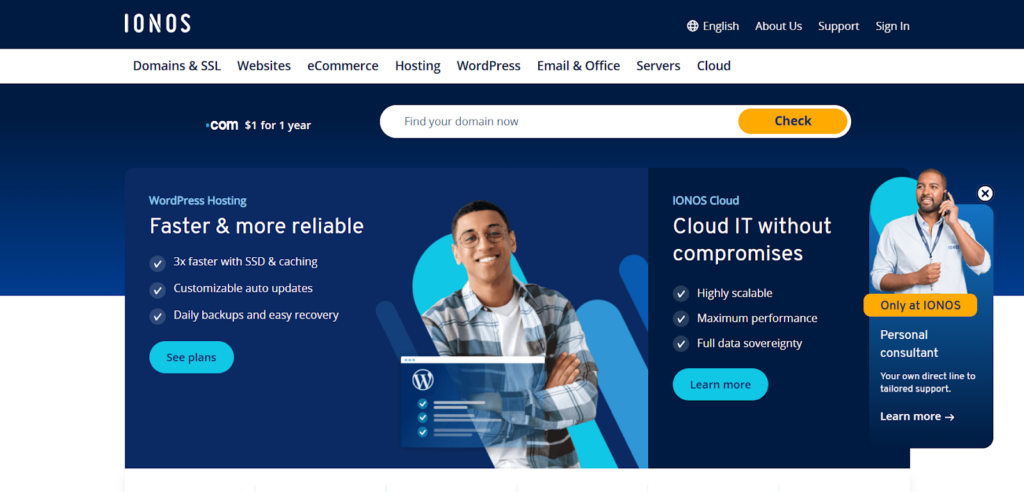
Previously known as 1&1, IONOS provides a range of hosting packages suitable for e-commerce. The Web Hosting Expert plan is tailored for online store owners and includes features such as:
- 500 GB of storage;
- One-click installer compatible with platforms like Shopify;
- 99.99% uptime supported by two data centers;
- Integrated website analytics;
- Enhanced CPU resources.
One of IONOS’ key advantages is its fast loading speeds, reportedly outperforming competitors like Bluehost, GoDaddy, and HostGator. However, the control panel may have a steeper learning curve, meaning you might need additional time to adjust settings.
G2 Rating: 3.5 out of 5 stars
Pricing: $8/month for the first 12 months; $16/month thereafter.
A2 Hosting
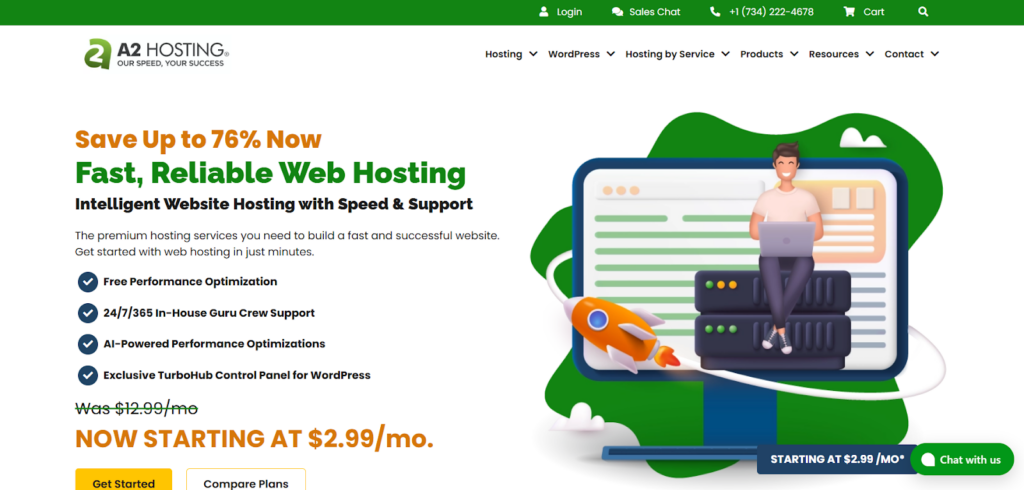
A2 Hosting offers various packages for e-commerce site owners. Their shared hosting plans are a solid choice for new sites, while businesses experiencing growth may benefit from upgrading to managed VPS hosting. This upgrade provides access to features such as:
- Free SSL certificate;
- 99.9% uptime commitment;
- Fast loading speeds;
- 250 GB SSD storage;
- Integration with PHP-based platforms like Magento, Drupal, and Joomla.
A unique benefit of A2 Hosting is its commitment to sustainability. The company supports green initiatives by planting trees in Ann Arbor, Michigan, with every new package purchase. This option is worth considering if sustainability aligns with your brand values.
G2 Rating: 4.4 out of 5 stars
Pricing: Starting at $11.99/month for shared hosting plans.
SiteGround
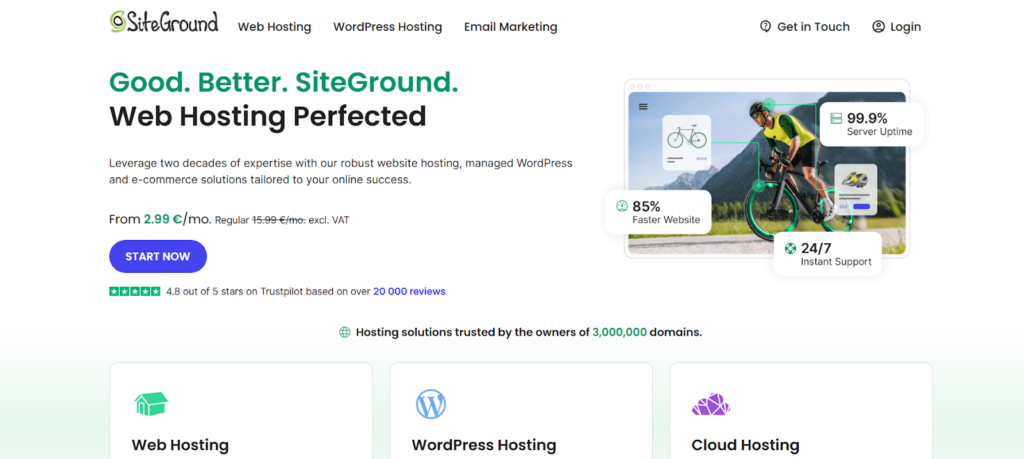
SiteGround hosts over 2.8 million domains and has a customer satisfaction rate of 98%. Endorsed by WordPress, its hosting service offers e-commerce site owners benefits like:
- Continuous security monitoring;
- 24/7 customer support;
- Daily free backups;
- Cloudflare integration;
- WooCommerce hosting integration.
It’s important to note that SiteGround is no longer PCI compliant, which means additional fees may be required to use a compliant e-commerce platform for processing payments.
G2 Rating: 4.3 out of 5 stars
Pricing: Starting at $4.99 per month.
DreamHost
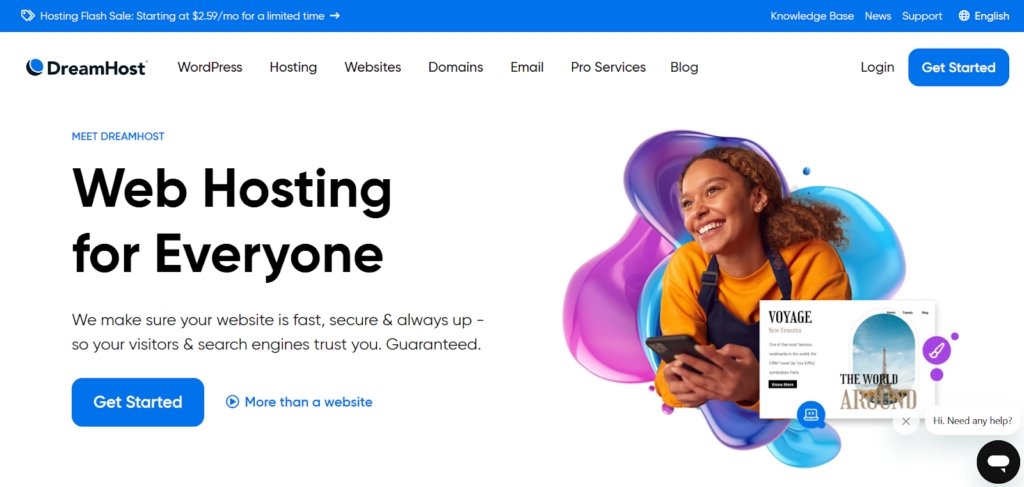
DreamHost is a popular web hosting service that guarantees 100% uptime, making it a top choice for WordPress websites. Its e-commerce plans include the WooCommerce plugin along with features such as:
- Unlimited email accounts;
- At least 30 GB of SSD storage;
- One-click staging;
- Free WordPress migrations.
Additional benefits include strong security features, domain management tools, unlimited data transfers per month, a shared hosting money-back guarantee, and 24/7 expert support.
G2 Rating: 4.0 out of 5 stars
Pricing: Starting at $2.59 per month for the shared starter plan.
InMotion Hosting
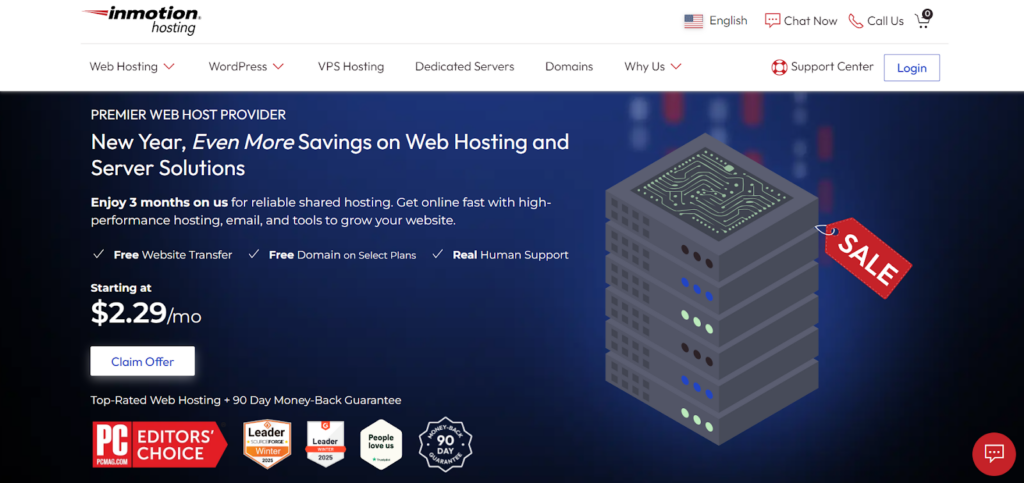
InMotion Hosting is suitable for e-commerce businesses of all sizes, offering a variety of hosting plans with a simple setup process and dependable customer support. Although base plans have storage limits, they include key features like:
- Free SSL certificate;
- Optimization for PrestaShop, Magento, OpenCart, and WooCommerce;
- 24/7 customer support;
- Advanced caching.
G2 Rating: 3.9 out of 5 stars
Pricing: Plans start at $2.49 per month.
HostGator
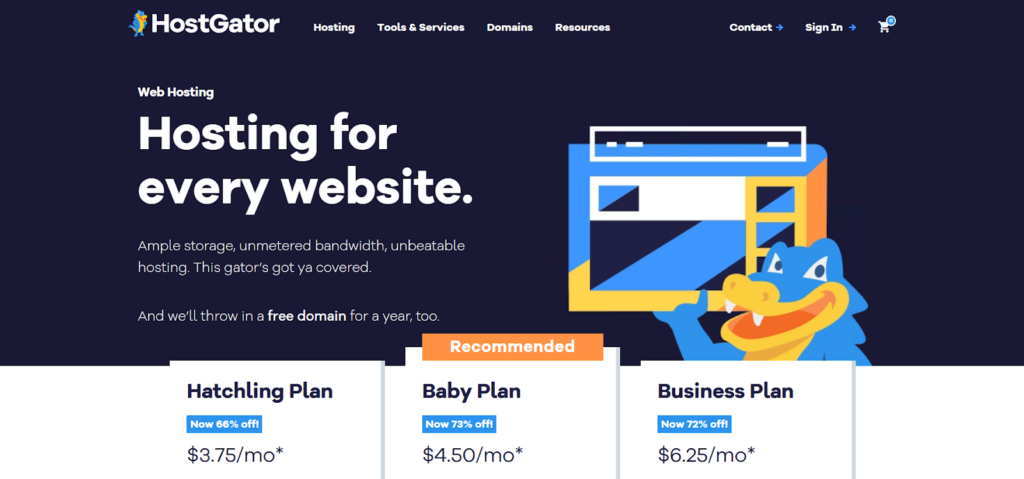
HostGator is a well-known option for e-commerce hosting, trusted by over two million websites. Its private VPS plans come with features such as:
- 99.9% uptime guarantee;
- 24/7 support available via phone or live chat every day of the year;
- Weekly off-site automatic backups;
- Unlimited email accounts.
Keep in mind that as your e-commerce business grows, your monthly fee may increase. Introductory offers are typically lower than renewal prices, so be prepared for higher costs once your initial term expires.
G2 Rating: 3.6 out of 5 stars
Pricing: From $19.95 per month for private VPS hosting.
How to Choose the Right E-commerce Hosting Provider
With thousands of e-commerce hosting providers available, selecting the right one can be challenging. Your hosting provider plays a crucial role in your store’s performance, security, and reliability. Here are five key factors to consider when making your decision.
Pricing
A quality e-commerce host helps ensure your website remains accessible to customers at all times. While reliable hosting is worth the investment, costs can vary significantly depending on features and scalability.
Review pricing structures carefully to identify any hidden fees. Some providers charge extra for essential features like analytics, file storage, bandwidth overages, and branded email accounts.
For a more cost-effective solution, consider e-commerce platforms that bundle hosting with other features under a single monthly fee. For example, Shopify’s hosting starts at $29 per month and includes unlimited bandwidth, a domain name, inventory management, and PCI compliance. Paying separately for these services through a self-hosted provider could lead to higher long-term costs.
Speed and Bandwidth
Website performance directly impacts customer experience and conversion rates. A one-second improvement in page load speed can boost mobile conversions by up to 27%. Faster sites also rank higher in search results, as site speed is a factor in Google’s ranking algorithm.
Check each provider’s bandwidth allowance—the maximum data transfer capacity between your website and visitors within a given period. Exceeding bandwidth limits can cause site slowdowns or outages, leading to lost sales.
Look for providers that offer unlimited bandwidth, ensuring your site can handle traffic spikes without interruptions. This becomes especially important as your business scales and attracts more visitors.
Uptime and Reliability
Every second your store is offline results in lost sales. Choose a hosting provider with a strong track record of minimal downtime and reliable performance.
Independent tools like Uptime and Pingdom provide reports on hosting providers, including response times and issue resolution rates. Ideally, choose a provider with an uptime guarantee as close to 100% as possible.
Additionally, confirm whether the provider offers backup solutions in case of data loss or technical issues. Small businesses with fewer updates may only need weekly backups, while larger stores with extensive inventories benefit from daily backups.
Assess the provider’s infrastructure, including security measures, redundant power sources, and cooling systems to prevent server failures. A well-protected data center reduces the risk of unexpected downtime.
Privacy and Security
Every website owner faces security risks, including cyberattacks that can compromise data and disrupt operations. Criminals may inject malicious code, intercept sensitive information, or launch distributed denial-of-service (DDoS) attacks that overwhelm a website’s server, making it inaccessible.
To reduce these risks, choose a hosting provider with built-in security features, such as:
- Malware scanning – Identifies and removes harmful software before it affects your site;
- DDoS protection – Prevents attackers from overloading your website with traffic;
- Firewalls – Blocks unauthorized access to sensitive data.
Additionally, WHOIS lookups allow anyone to access information about a domain, including registration details and ownership. If you prefer to keep this private, look for a provider that offers WHOIS protection to prevent unauthorized access to this information.
An SSL certificate is another essential security feature. Without one, browsers will label an e-commerce store as “Not secure,” which can deter customers from making purchases. SSL encryption protects data transferred between users and the website, ensuring transactions remain private. Many hosting providers include free SSL certificates as part of their plans.
For e-commerce sites processing payments, PCI compliance is critical. The Payment Card Industry Data Security Standard (PCI DSS) ensures secure payment processing by requiring businesses to follow strict security protocols. Without PCI compliance, accepting payments from major credit card providers like Visa, Mastercard, and American Express may not be possible.
For added security, consider integrating a service like Cloudflare, which acts as an intermediary between visitors and the hosting server. This additional layer of protection helps prevent cyber threats while improving site performance.
Customer Support
Managing a website becomes more complex as traffic increases, so reliable customer support is essential when choosing a hosting provider.
While many providers advertise 24/7 customer support, the quality of assistance can vary. It’s important to evaluate support options, including:
- Live chat and phone support – Useful for urgent issues that require immediate attention;
- Email and ticketing systems – Allows for non-urgent inquiries without waiting in a queue.
Hosting providers often offer different levels of support based on pricing tiers. SaaS platforms typically bundle customer support into their plans, while self-hosted solutions may require an additional fee for faster response times or dedicated assistance.
Conclusion
Choosing the right e-commerce web hosting provider is a crucial decision that impacts website performance, security, and scalability. Whether opting for a SaaS-based solution for ease of use or a self-hosted platform for greater control, businesses should evaluate factors such as pricing, uptime, speed, and customer support. Security features like SSL certificates, PCI compliance, and DDoS protection are essential for protecting customer transactions. Reliable hosting ensures an online store remains accessible and operational, supporting business growth and a smooth shopping experience.
Posted in blog, E-commerce
Alex Carter
Alex Carter is a cybersecurity enthusiast and tech writer with a passion for online privacy, website performance, and digital security. With years of experience in web monitoring and threat prevention, Alex simplifies complex topics to help businesses and developers safeguard their online presence. When not exploring the latest in cybersecurity, Alex enjoys testing new tech tools and sharing insights on best practices for a secure web.
